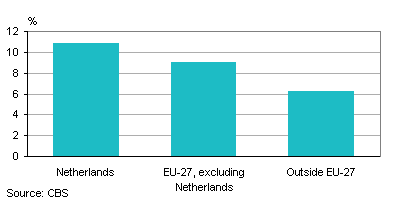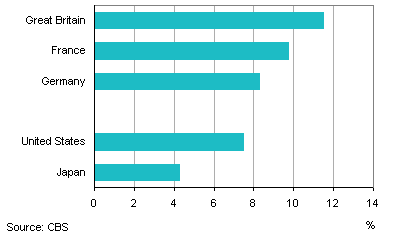Foreign companies in the Netherlands: more productive but not more profitable

The average labour productivity of Dutch companies under foreign control in 2008-2011 was considerably higher than of other Dutch companies. This is evident from data on the companies in the business economy. Every year the added value per person employed of subsidiaries of foreign multinational enterprises is about 40.000 euros higher.
Average labour productivity, 2008-2011

Higher operating costs foreign companies
Foreign companies in the Netherlands face higher operating costs, because they are dealing with a less familiar market, culture, language and legislation. They will only operate in the Netherlands if these costs can be sufficiently compensated. This compensation expresses itself in a higher average labour productivity. Beside compensation effects, the higher productivity can partially be explained by the fact that these companies enjoy economies of scale due to their size.
Productivity differences by region
Companies from outside the EU-27 are most productive. This is mostly caused by the influence of companies with ultimate control in the Unites States. These companies are responsible for as much as 65% of the added value produced by firms with a parent company outside of the EU-27. With a labour productivity of 120 thousand euros they significantly increase the average.
Within the EU-27 the United Kingdom, Germany and France are most influential when it comes to average labour productivity. Together they produce a total of 75% of the total added value originating from firms with a foreign parent company in the EU-27.
Average labour productivity by region, 2011

Average labour productivity five biggest contributors, 2011

Consequences for the profit margins
The gross operating rate paints a contrasting picture. Firms with foreign parent companies, despite their high labour productivity, have a smaller operating profit margin or return on sales. This indicates that the higher costs resulting from the companies’ foreignness are not fully compensated. Foreign companies in the Netherlands have, for example, higher personnel costs per employee.
The companies with ultimate control in countries outside of the EU-27 keep the smallest percentage of their turnover. These countries are institutionally and socio-economically most distant from the Dutch economy. Subsidiaries of multinational enterprises from these countries will have the highest costs of adaptation in the Netherlands which subsequently can lead to a lower gross operating rate.
Gross operating rate by region, 2011

Gross operating rate five biggest contributors, 2011

Linda Bruls
Bron: Buitenlandse zeggenschap over bedrijven in Nederland; kerncijfers, SBI 2008